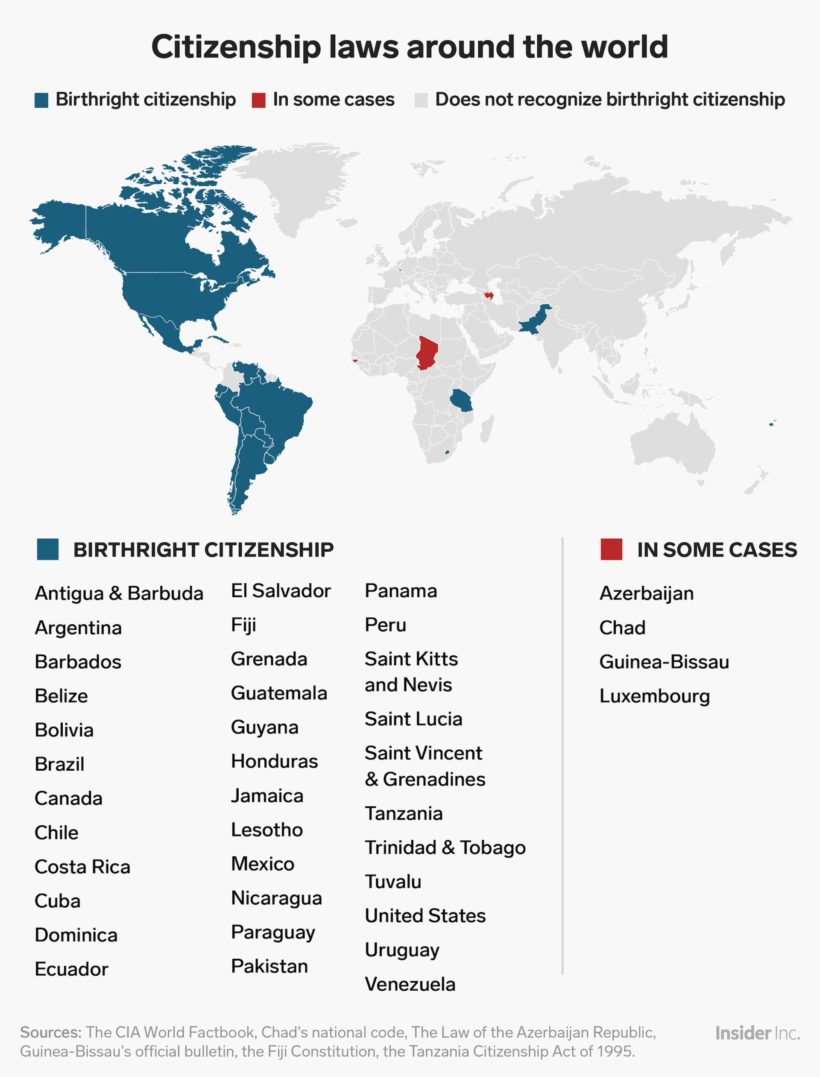
redo Jump to...
print Print...
(by Will Racke, The Daily Caller) – In the U.S., birthright citizenship traces back to a clause in the 14th Amendment to the Constitution, passed just after the Civil War. The amendment’s citizenship clause states, “All persons born or naturalized in the United States, and subject to the jurisdiction thereof, are citizens of the United States.”
The clause itself is based on the legal concept of jus soli, or citizenship by “right of soil,” which contrasts with jus sanguinis, or citizenship by familial descent. It has been widely taken to apply to anyone born within U.S. territorial jurisdiction regardless of the immigration status of their parents, with the notable exception of foreign diplomats.
In its 1898 ruling in the Wong Kim Ark case, the Supreme Court held that the children of non-citizens, when born on U.S. territory, are U.S. citizens by birth. However, the parents in question in the Wong Kim Ark case were legal immigrants, meaning the court did not directly address the status of children born to parents in the U.S. illegally.
That unanswered question gives Trump room to argue the citizenship clause has been too widely interpreted, according to Johns Hopkins University professor Martha Jones, an expert on birthright citizenship.
“A narrowly tailored Executive Order that rested on the view that the children of unauthorized immigrants are not subject to the jurisdiction of the US (in citizenship terms) and thus not citizens by virtue of Birthright is an argument that can be made,” Jones wrote Tuesday on Twitter.
With his order, Trump aims to force the Supreme Court to update its interpretation of the citizenship clause by explicitly ruling on the question of whether the clause applies to children born to people in the U.S. illegally.
What other countries have birthright citizenship?
Most countries in the world do not offer birthright citizenship — only 30 out of the world’s 194 nations automatically grant citizenship to children born to illegal immigrant parents, according to the Center for Immigration Studies (CIS).
No European country has birthright citizenship, and the global trend over the past 30 years has been to halt the practice. Notable countries that have ended birthright citizenship in recent decades include the U.K. in 1983, Australia in 1986, India in 1987, France in 1993 and Ireland in 2004.
The Western Hemisphere is a major exception — of the 30 countries that offer birthright citizenship, 29 are in North or South America. The U.S. and Canada are alone among developed nations worldwide that automatically grant citizenship to people born within their territorial jurisdiction.
Why do some immigration reformers want to end birthright citizenship?
…[Those opposed to birthright citizenship] argue that the practice encourages illegal immigration and benefits fraud by people who want to come to the U.S. for the express purpose of giving birth to an American citizen.
Between 2000 and 2008, an average of roughly 300,000 children were born to an illegal immigrant mother each year. That average has declined since the Great Recession, but there were about 275,000 babies were born to illegal immigrant parents in 2014, according to the Pew Research Center.
Because all of those children are U.S. citizens, they are eligible to eventually sponsor relatives for immigrant visas, creating a cycle of chain migration benefiting people who violated immigration law. Some reformers also argue that birthright citizenship promotes abuse of welfare programs because illegal immigrants can obtain benefits, including Medicaid, food stamps and certain tax credits, through their U.S. citizen children.
Then there is the issue of birth tourism, in which foreign nationals travel to the U.S. on business or tourist visas with the aim of giving birth to an American citizen. Estimates vary widely, but a 2015 CIS analysis found that more than 30,000 births to foreign “tourists” occur annually. Countries widely known for sending birth tourists to the U.S. include China, Russia and Mexico.
“The growth of the birth tourism industry illustrates how the executive branch’s broad application of the Citizenship Clause can have the effect of transferring control over the nation’s immigration policy from the American people to foreigners,” Jon Feere, a former Center for Immigration Studies fellow now working in the Trump administration, told Congress in 2015.
Can Trump end birthright citizenship without changing the Constitution?
If Trump does follow through on an executive order to change birthright citizenship, it would immediately be challenged by civil rights and immigration activist groups. The ensuing court battle would likely end up in the Supreme Court, where justices would have to weigh overturning more than a century of legal precedent with respect to the 14th Amendment’s citizenship clause.
In that case, it is far from certain the Supreme Court would rule the president has the constitutional authority to change a long-held legal interpretation of birthright citizenship via executive order. …
Separately, Trump can pursue an end to birthright citizenship by prodding Republican allies in Congress to advance a bill mirroring his executive order. GOP Sen. Lindsey Graham of South Carolina said Tuesday he would introduce such a measure, calling birthright citizenship an “absurd” policy and a “magnet for illegal immigration.”
Even so, it’s not clear the Supreme Court would be any more amenable to a constitutional reinterpretation of the citizenship clause from Congress that it would from an executive order. …
Published October 30, 2018 at DailyCaller .com. Reprinted here November 1, 2018 for educational purposes only. May not be reproduced on other websites without permission from The Daily Caller.
Questions
1. a) What does the clause of the 14th Amendment say?
b) On what legal concept is it based?
c) How has it been used?
2. Why didn’t the Supreme Court address the status of children born to illegal immigrant parents in the Wong Kim Ark case? (see para. 3)
3. How does Johns Hopkins University professor Martha Jones, an expert on birthright citizenship, explain the legitimacy of President Trump’s argument on birthright citizenship? (see para. 4-5)
4. By enacting an executive order on birthright citizenship, what does President Trump want the U.S. Supreme Court to do? (see para. 6)
5. Answer the following questions about birthright citizenship in countries around the world: (para. 7-9)
a) In how many of the world’s 194 countries is birthright citizenship permitted?
b) In how many of Europe’s 50 countries is birthright citizenship permitted?
c) In what years did the following countries end birthright citizenship: UK, Australia, India, France, Ireland?
d) Of the 30 countries that offer birthright citizenship, how many are in North and South America?
e) Name the two developed countries that allow birthright citizenship.
f) What do you think about the fact that people are not moving in large numbers to most of the countries that offer birthright citizenship?
6. How does birthright citizenship benefit the family members of people who come to the U.S. illegally? (see para. 12)
7. What is birth tourism?
8. a) Read the “Background” below the questions. What is the main idea of the editorial excerpted here?
b) Does Mr. Spakovsky make a persuasive argument? Explain your answer.
Background
Birthright Citizenship: A Fundamental Misunderstanding of the 14th Amendment by Hans von Spakovsky (Oct. 30, 2018, The Daily Signal)
…The 14th Amendment doesn’t say that all persons born in the U.S. are citizens. It says that “[a]ll persons born or naturalized in the United States and subject to the jurisdiction thereof” are citizens. That second, critical, conditional phrase is conveniently ignored or misinterpreted by advocates of “birthright” citizenship.
Critics erroneously believe that anyone present in the United States has “subjected” himself “to the jurisdiction” of the United States, which would extend citizenship to the children of tourists, diplomats, and illegal aliens alike.
But that is not what that qualifying phrase means. Its original meaning refers to the political allegiance of an individual and the jurisdiction that a foreign government has over that individual.
The fact that a tourist or illegal alien is subject to our laws and our courts if they violate our laws does not place them within the political “jurisdiction” of the United States as that phrase was defined by the framers of the 14th Amendment.
This amendment’s language was derived from the 1866 Civil Rights Act, which provided that “[a]ll persons born in the United States, and not subject to any foreign power” would be considered citizens.
Sen. Lyman Trumbull, a key figure in the adoption of the 14th Amendment, said that “subject to the jurisdiction” of the U.S. included not owing allegiance to any other country.
As John Eastman, former dean of the Chapman School of Law, has said, many do not seem to understand “the distinction between partial, territorial jurisdiction, which subjects all who are present within the territory of a sovereign to the jurisdiction of that sovereign’s laws, and complete political jurisdiction, which requires allegiance to the sovereign as well.”
In the famous Slaughter-House cases of 1872, the Supreme Court stated that this qualifying phrase was intended to exclude “children of ministers, consuls, and citizens or subjects of foreign States born within the United States.” This was confirmed in 1884 in another case, Elk vs. Wilkins, when citizenship was denied to an American Indian because he “owed immediate allegiance to” his tribe and not the United States.
American Indians and their children did not become citizens until Congress passed the Indian Citizenship Act of 1924. There would have been no need to pass such legislation if the 14th Amendment extended citizenship to every person born in America, no matter what the circumstances of their birth, and no matter who their parents are.
Even in U.S. v. Wong Kim Ark, the 1898 case most often cited by “birthright” supporters due to its overbroad language, the court only held that a child born of lawful, permanent residents was a U.S. citizen. That is a far cry from saying that a child born of individuals who are here illegally must be considered a U.S. citizen.
Of course, the judges in that case were strongly influenced by the fact that there were discriminatory laws in place at that time that restricted Chinese immigration, a situation that does not exist today.
The court’s interpretation of the 14th Amendment as extending to the children of legal, noncitizens was incorrect, according to the text and legislative history of the amendment. But even under that holding, citizenship was not extended to the children of illegal aliens—only permanent, legal residents. …


